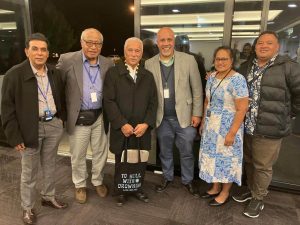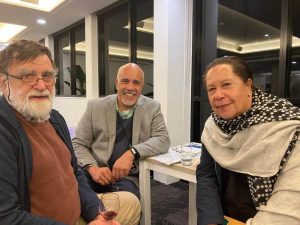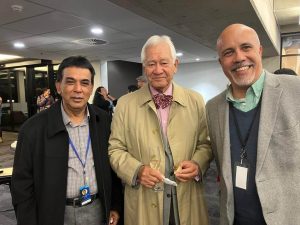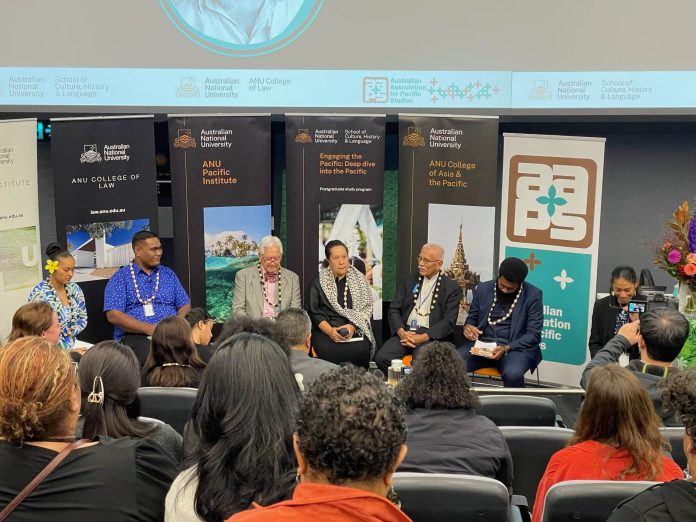A group of former leaders of Pacific island nations have condemned the AUKUS security pact saying it is “bringing war much closer to home2 and goes against the Blue Pacific narrative.
The deal between Australia, the United States and the United Kingdom will see Canberra forking out billions of dollars over the next three decades to acquire a fleet of nuclear submarines.
In a swingeing criticism of the agreement, the Pacific Elders’ Voice, which includes former leaders of Kiribati, the Marshall Islands, Tuvalu and Palau, said Australia was deliberately exploiting a loophole in the Pacific’s nuclear-free agreement, the Rarotonga Treaty, which permits the transit of nuclear-powered craft such as submarines.
“AUKUS signals greater militarisation by joining Australia to the networks of the US military bases in the northern Pacific and it is triggering an arms race, by bringing war much closer to home,” the Pacific elders said in a statement.
“Not only does this go against the spirit of the Blue Pacific narrative, agreed to all [Pacific Islands] Forum member countries last year, it also demonstrates a complete lack of recognition of the climate change security threat that has been embodied in the Boe and other declarations by Pacific leaders.”
The group stated that the “staggering” amount of money committed to AUKUS “flies in the face of Pacific islands countries, which have been crying out for climate change support”.
“The fact that not even a significant fraction of this figure is available for the region to deal with the greatest security threat shows a complete lack of sensitivity to this key Pacific priority in Canberra, London, Paris and Washington,” they wrote.
They also raised concerns about New Zealand’s ambitions to join the trilateral security deal, saying the Forum should discourage Aotearoa from joining the “military alliance”.
“We are urging the Pacific Island Leaders to take a decisive and ethical stand on this important matter and not to be subsumed by the AUKUS nations. This does not only put our region at greater risk of a nuclear war but the real environmental impacts arising out of any incidents will be huge,” they said.
One of the spokespersons for the Pacific Elders’ Voice, former Kiribati president Anote Tong told RNZ Pacific it was disappointing that Australia – as a founding Forum member – was ready to commit over $3 billion (US$2 billion) for military expansionism.
Australia is also a signatory to the 2050 Strategy for the Blue Pacific, which is the strategy that underscores the climate crisis as the region’s single greatest security threat.
“In the Pacific, we have always been saying loud and clear that the greatest challenge to our security has been climate change. It has always always been at the top of the agenda,” Tong said.
“We understand that the security priorities of the AUKUS partners is different from our priority, but at least we also have the existing arrangements in the region with respect to nuclear.”
Australia, Tonga said, was more concerned about the geopolitics when it came to concerns about security.
But for Pacific islands “security is what is the threat that we see challenging our future existence and it is climate change,” he said.
“It is not China or what is happening on the other side of the world.”
The recent attempts by the Australian government to reassure regional leaders that AUKUS would not breach the Rarotonga agreement demonstrates the lack of consultation on Canberra’s part, according to the former Kiribati leader.
“The consultations are taking place [now], but if that had taken place before all of this had happened it would have removed all of these concerns. If we all understood what it involves [and] I am sure if Pacific leaders were happy with it and the region feels that here is no threat to the existing [security] arrangement, then we would have no opposition to what is going on.”

Tong said Australia needed to “step up as a part of the Pacific family”.
He said anytime that a major decision, like AUKUS, was made all Pacific nations must be consulted.
“We have known what has happened in the past when some countries have felt left out so we could have fragmentation,” he said, referencing the Solomon Islands security pact with China which was condemned by other Pacific countries for the lack of consultation on Honiara’s part.
“We do not want to repeat it. We all have an interest in what goes on in our Blue Pacific. It has to be an every-way process, not just a one-way process.”

But while the former leaders group, the Forum, and several regional leaders have expressed strong opposition, a few have publicly supported Australia’s plans – including Fijian Prime Minister Sitiveni Rabuka and Palau’s President Saurengal Whipps Jr.
Whipps told RNZ Pacific in an interview that as part of peace and security “you also have to have the capability of deterrent”.
“We support what Australia has done because we believe that it is important that Australia is ready and is prepared to defend the Pacific,” he said.
He said Oceania’s largest economy was the first to assist its smaller neighbours with illegal, unreported and unregulated (IUU) fishing and maritime security.
“Australia is doing its part in making sure that we protect freedom and democracy and peace, provide peace and security in the region is important.”
Whipps said Palau had held seven referendums to amend its constitution to allow the US to transmit nuclear submarines or vessels through its waters because it was about peace and security.
“Now, should they be testing nuclear? Or dumping nuclear waste in our waters? No, we do not agree to that,” he said.
“But we also understand that nuclear energy is something that you need. It powers aircraft carriers or powers, submarines, it powers power plants, and it’s clean energy.
“We need to continue to discuss and put everything into context as to where we are and how we can all do our part and make any increase in peace and security in the region.”

Last week, Vanuatu’s Climate Change Minister Ralph Regenvanu said in a tweet for Australia to assure its island neighbours that the nuclear submarines under the AUKUS agreement would not carry nuclear weapons.
Australia has signed up to the Treaty on the Prohibition of Nuclear Weapons (TPNW), a UN agreement that includes an unequivocal obligation for non-nuclear States Parties such as Australia to never acquire nuclear weapons.
“The Australian Government has confirmed unequivocally that we do not seek, and will not acquire nuclear weapons,” a Department of Foreign Affairs and Trade spokesperson told RNZ Pacific.
“This reflects Australia’s existing international legal obligations under the TPNW and the South Pacific Nuclear Free Zone Treaty (SPNFZ), both of which we ratified decades ago.”
The spokesperson said the Australian Government had reaffirmed that it would continue to meet in full its obligations under the TPNW and the SPNFZ Treaty.
“Australia has underscored the above position with Pacific governments, particularly during consultative engagements on AUKUS over the past 18 months.
“The Australian Government shares the ambition of TPNW States Parties of a world without nuclear weapons. It is committed to engaging constructively to identify possible pathways towards nuclear disarmament and to an ambitious agenda to advance nuclear non-proliferation and disarmament,” the DFAT spokesperson added.
SOURCE: RNZ PACIFIC/PACNEWS













